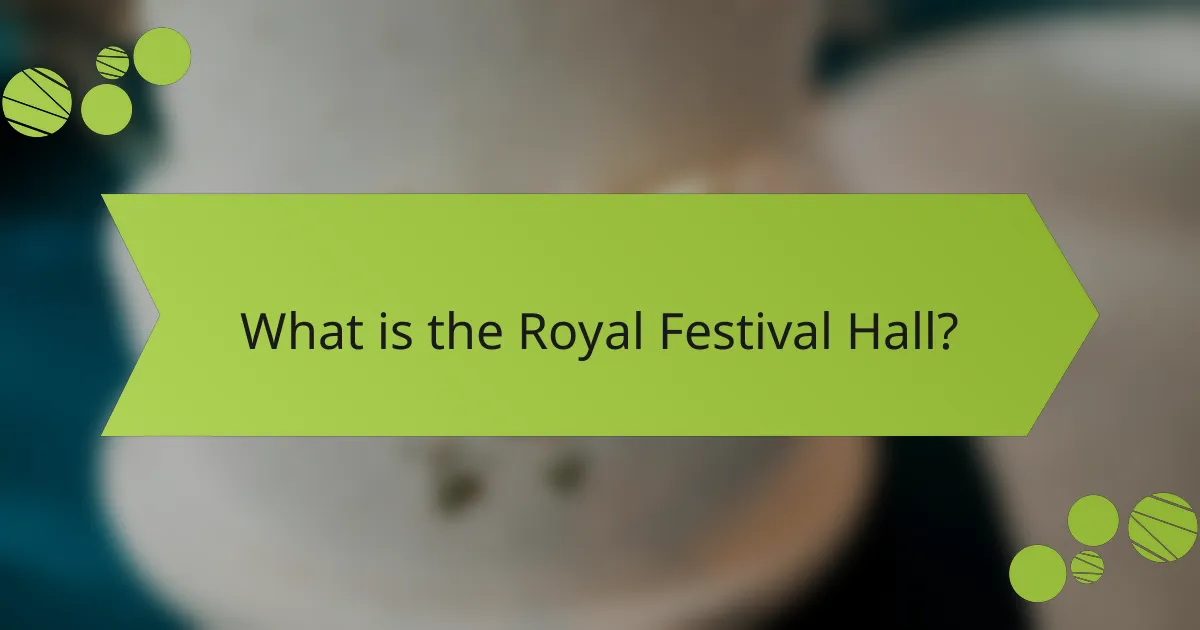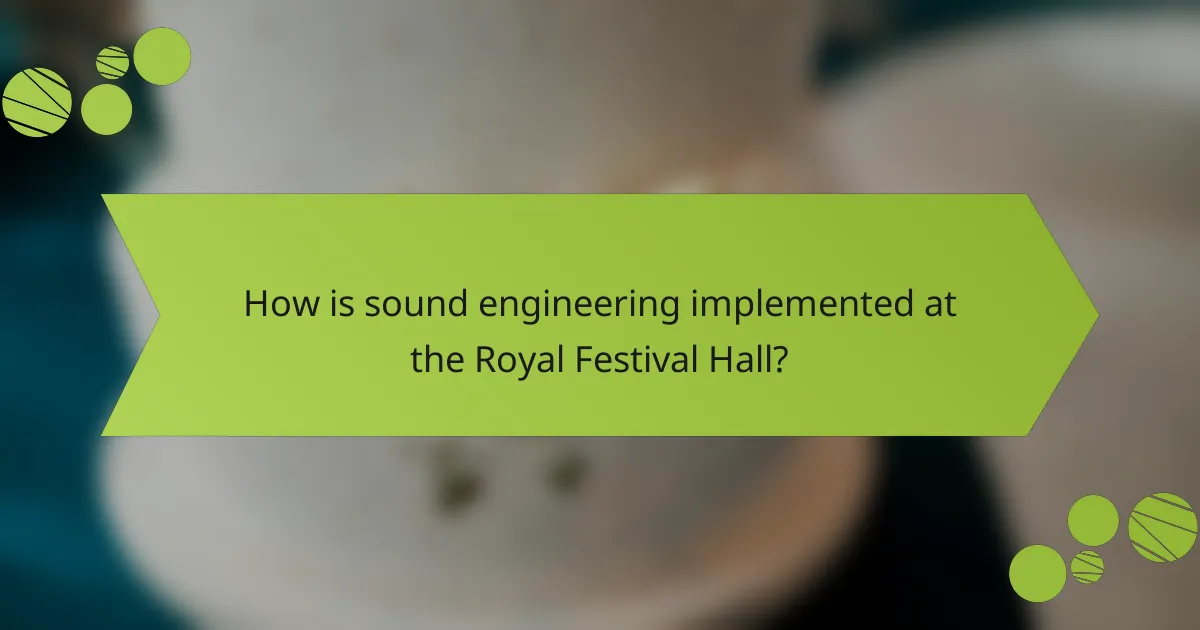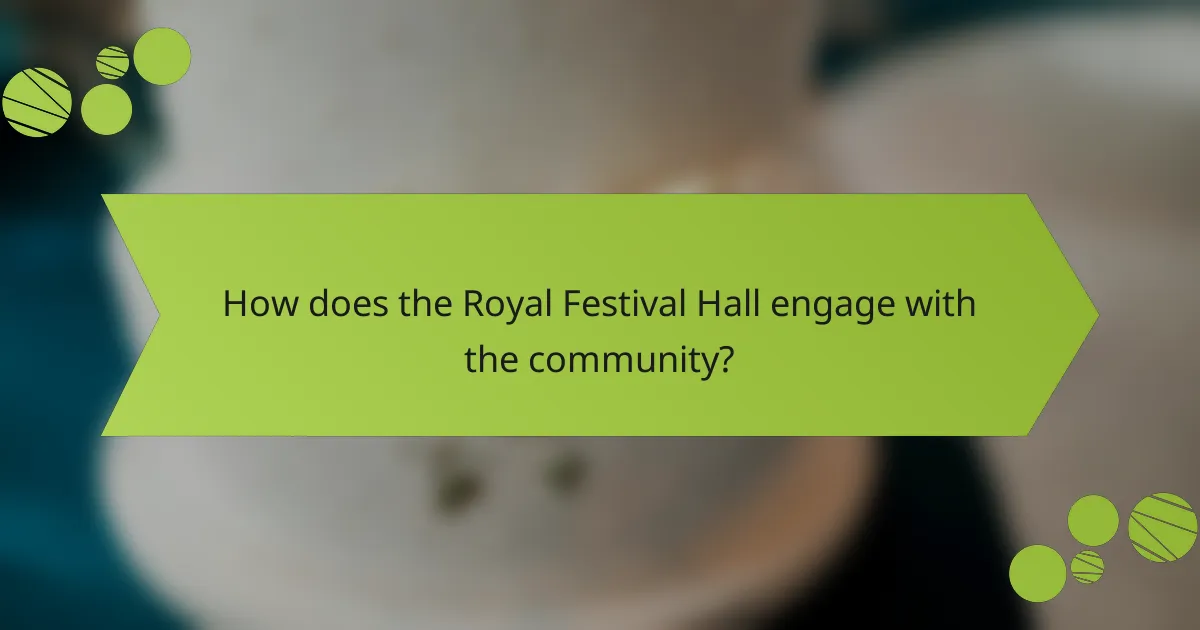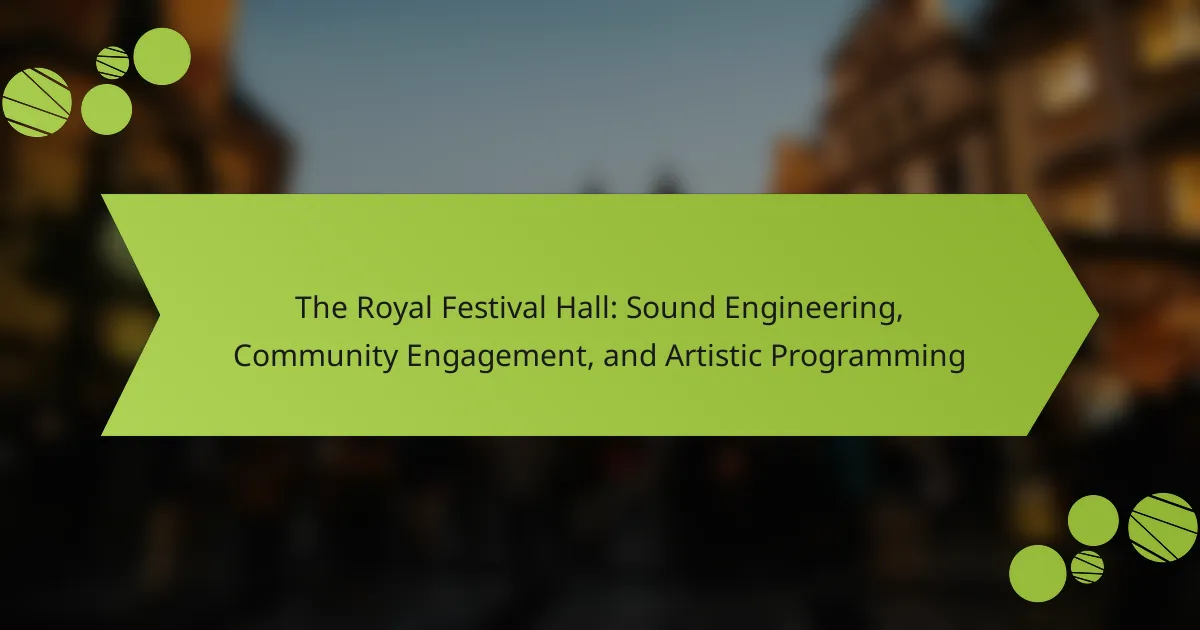The Royal Festival Hall is a prominent concert hall located in London, part of the Southbank Centre arts complex, known for its modernist design by architect Sir Hugh Casson. Since its opening in 1951 for the Festival of Britain, the venue has a seating capacity of approximately 2,500 and hosts a diverse range of performances, including classical music, jazz, and contemporary shows. The hall is recognized for its exceptional sound quality, achieved through advanced acoustic design and state-of-the-art sound engineering techniques. Additionally, the Royal Festival Hall actively engages with the community through outreach programs, free concerts, educational initiatives, and collaborations with local artists, fostering inclusivity and participation in the arts.

What is the Royal Festival Hall?
The Royal Festival Hall is a concert hall located in London. It is part of the Southbank Centre, a prominent arts complex. Opened in 1951, the hall was built for the Festival of Britain. It features a distinctive modernist design by architect Sir Hugh Casson. The venue has a seating capacity of approximately 2,500. It hosts a variety of performances, including classical music, jazz, and contemporary shows. The Royal Festival Hall is known for its excellent acoustics and sound engineering. It plays a significant role in community engagement and artistic programming in London.
How did the Royal Festival Hall come to be established?
The Royal Festival Hall was established as part of the Festival of Britain in 1951. The British government aimed to promote a sense of national recovery after World War II. Designed by the architect Sir Hugh Casson, the hall became a central feature of the festival. It was built on the South Bank of the River Thames. The venue was intended to showcase British music and culture. Construction began in 1949 and was completed in 1951. The hall was officially opened on May 3, 1951. It has since become a key location for concerts and performances in London.
What historical significance does the Royal Festival Hall hold?
The Royal Festival Hall is historically significant as a key cultural venue in London. Opened in 1951, it was part of the Festival of Britain, which aimed to promote national recovery after World War II. The hall symbolizes post-war optimism and cultural renewal in the UK. It was one of the first major concert halls built in the UK after the war. The design by architects Leslie Martin and Peter Moro emphasized modernist aesthetics and acoustics. The venue has hosted numerous iconic performances and events, solidifying its status in the arts. Its role in fostering community engagement through diverse programming is also notable. The Royal Festival Hall remains a landmark of cultural significance in London’s artistic landscape.
What architectural features define the Royal Festival Hall?
The Royal Festival Hall is defined by its modernist architectural features. It features a distinctive concrete structure with large expanses of glass. This design allows for natural light to flood the interior spaces. The hall has a unique, sweeping roof that enhances its aesthetic appeal. Its interior is characterized by a flexible seating arrangement that accommodates various performances. Additionally, the hall incorporates advanced acoustic design to optimize sound quality. The use of simple, functional materials reflects the principles of modernist architecture. These features collectively contribute to the hall’s iconic status in London’s cultural landscape.
What role does the Royal Festival Hall play in the cultural landscape?
The Royal Festival Hall serves as a significant cultural venue in London. It hosts a diverse range of performances, including classical music, jazz, and contemporary art. This venue is known for its exceptional acoustics and innovative sound engineering. It plays a key role in community engagement by offering educational programs and outreach initiatives. The hall is also a central hub for artistic programming, attracting both local and international artists. Historically, it has been a site for major cultural events since its opening in 1951. The Royal Festival Hall contributes to the vibrancy of the Southbank Centre, enhancing the cultural landscape of the area.
How does the Royal Festival Hall contribute to the arts in the community?
The Royal Festival Hall enhances the arts in the community through diverse programming and accessibility initiatives. It hosts a wide range of performances, including concerts, theater, and dance, attracting various audiences. The venue actively engages local artists and collaborates with community organizations. It offers educational programs and workshops that foster creativity among residents. Additionally, the Hall provides affordable ticket options to ensure inclusivity. By creating a vibrant cultural hub, it strengthens community ties and promotes artistic expression. The Royal Festival Hall is a key player in London’s cultural landscape, contributing significantly to the local arts scene.
What types of events are hosted at the Royal Festival Hall?
The Royal Festival Hall hosts a variety of events including concerts, theatrical performances, and community gatherings. Concerts feature orchestras, solo artists, and various genres of music. Theatrical performances include plays, dance shows, and multimedia presentations. Community gatherings often focus on local cultural events and educational programs. The venue also accommodates festivals and special events throughout the year. Each event type reflects the hall’s commitment to diverse artistic programming. The Royal Festival Hall is known for its excellent acoustics and vibrant atmosphere, enhancing the audience experience.

How is sound engineering implemented at the Royal Festival Hall?
Sound engineering at the Royal Festival Hall is implemented through advanced acoustic design and state-of-the-art technology. The hall features a flexible sound system tailored for various performances. It utilizes digital mixing consoles and high-quality microphones to capture sound accurately. Acoustic panels and reflectors are strategically placed to enhance sound clarity. The venue also employs sound engineers who monitor audio levels during events. This ensures an optimal listening experience for the audience. The integration of these elements creates a unique auditory environment. The Royal Festival Hall is recognized for its exceptional sound quality in live performances.
What technologies are used in sound engineering at the Royal Festival Hall?
The Royal Festival Hall utilizes advanced digital audio processing technologies for sound engineering. These include a state-of-the-art sound reinforcement system. The system is designed to deliver high-quality audio to large audiences. It incorporates digital mixing consoles for precise audio control. Additionally, the venue employs sophisticated acoustical treatments to enhance sound clarity. The integration of audio networking technologies facilitates seamless communication between equipment. This ensures optimal sound quality throughout the hall. The use of advanced microphone systems captures performances with clarity and detail. These technologies collectively create an exceptional auditory experience for attendees.
How does acoustic design enhance performances at the Royal Festival Hall?
Acoustic design enhances performances at the Royal Festival Hall by optimizing sound clarity and richness. The hall features a unique shell structure that reflects sound effectively. This design allows for better projection of music and voices. Additionally, the use of adjustable acoustic panels tailors the sound experience for different performances. The hall’s materials, including wood and fabric, contribute to a warm sound quality. Research indicates that these features improve audience engagement and enjoyment. A study by the Royal Academy of Music highlights the importance of acoustic design in live performance settings. Enhanced acoustics lead to a more immersive experience for both performers and listeners.
What role do sound engineers play during events?
Sound engineers are responsible for managing audio quality during events. They set up and operate sound equipment. This includes microphones, speakers, and mixing consoles. Sound engineers ensure clear sound for performers and the audience. They adjust sound levels and balance audio during the event. Their work involves troubleshooting technical issues in real-time. Effective sound engineering enhances the overall experience of the event. A well-engineered sound system can significantly impact audience engagement and satisfaction.
How does sound engineering impact audience experience?
Sound engineering significantly impacts audience experience by shaping the auditory environment of performances. It enhances clarity and balance of sound, ensuring that every note is heard distinctly. Proper sound engineering creates an immersive atmosphere, engaging the audience more deeply. For example, in concert halls like the Royal Festival Hall, acoustics are designed to optimize sound distribution. This results in a richer auditory experience that can evoke emotions. Studies show that well-engineered sound can increase audience satisfaction by up to 30%. Additionally, sound engineering can influence the perception of a performance’s quality. Thus, effective sound engineering is crucial for a memorable audience experience.
What feedback do attendees give regarding sound quality?
Attendees frequently report mixed feedback regarding sound quality at the Royal Festival Hall. Many praise the clarity and balance of sound during performances. However, some attendees express concerns about echo and volume levels. Specific comments highlight instances where certain instruments were overpowering. Others note that seating location affects sound experience significantly. Additionally, feedback indicates that acoustic adjustments are sometimes needed for different events. Overall, the venue’s sound engineering receives both commendations and constructive criticism from its audience.
How does sound engineering adapt to different types of performances?
Sound engineering adapts to different types of performances by customizing audio setups based on specific requirements. Each performance type, such as orchestral, rock, or spoken word, has unique acoustic characteristics. For orchestral performances, engineers focus on capturing the full range of instruments with clarity and balance. In rock concerts, the emphasis shifts to amplifying vocals and electric instruments while managing feedback.
For spoken word events, sound engineers prioritize intelligibility and even sound distribution throughout the venue. The use of various microphones and speaker configurations is tailored to the performance type. Additionally, sound checks are conducted to ensure optimal sound quality before the event begins. This adaptability is crucial for enhancing audience experience and ensuring that the performance is delivered as intended.

How does the Royal Festival Hall engage with the community?
The Royal Festival Hall engages with the community through various outreach programs and events. It offers free concerts and performances that are accessible to all. Educational initiatives include workshops and masterclasses for local schools and organizations. The venue collaborates with community groups to host cultural events. It also provides opportunities for local artists to showcase their work. The Hall’s programming reflects the diverse interests of the surrounding community. These efforts foster inclusivity and encourage participation in the arts. The Royal Festival Hall actively seeks feedback from community members to improve its offerings.
What community programs are offered by the Royal Festival Hall?
The Royal Festival Hall offers various community programs aimed at engaging local audiences. These programs include workshops, educational events, and performances tailored for diverse community groups. Initiatives often focus on music, art, and cultural exchange. The hall collaborates with local schools and organizations to provide accessible opportunities. Programs are designed to foster creativity and enhance community participation in the arts. Regular events include free concerts and interactive sessions for families. The Royal Festival Hall’s commitment to community engagement is evident in its outreach efforts.
How do these programs promote accessibility to the arts?
These programs promote accessibility to the arts by providing diverse opportunities for participation. They offer workshops and events tailored for various skill levels. The Royal Festival Hall also collaborates with local communities to ensure inclusive programming. Accessibility features include sensory-friendly performances and materials in multiple languages. Data shows that such initiatives increase attendance from underrepresented groups. Research indicates that community engagement fosters a sense of belonging and ownership in the arts. Programs specifically designed for people with disabilities further enhance access. These efforts collectively break down barriers and encourage wider audience participation.
What initiatives support local artists at the Royal Festival Hall?
The Royal Festival Hall supports local artists through various initiatives. These initiatives include artist residencies, which provide space and resources for creative development. The venue also hosts community engagement programs that connect local artists with audiences. Additionally, there are opportunities for local artists to showcase their work in curated events. The Royal Festival Hall collaborates with local organizations to foster artistic growth. These efforts aim to enhance the cultural landscape of the community.
How does the Royal Festival Hall foster audience participation?
The Royal Festival Hall fosters audience participation through interactive programming and community engagement initiatives. It offers workshops and events that encourage audience involvement. These activities allow attendees to engage with artists and performances directly. The venue also hosts open rehearsals, providing insight into the creative process. Additionally, the Royal Festival Hall includes audience feedback mechanisms during events. This approach enhances the overall experience and builds a sense of community. The hall’s diverse programming caters to various demographics, promoting inclusivity. Overall, these elements create a dynamic environment for audience interaction.
What opportunities exist for community members to get involved?
Community members can get involved at the Royal Festival Hall through various programs and initiatives. Volunteer opportunities are available for events and performances. Workshops and educational programs invite participation from local residents. Community engagement projects encourage collaboration with artists and sound engineers. Public forums allow community input on artistic programming. Collaborative events often feature local talent and highlight community stories. Membership programs provide exclusive access to events and behind-the-scenes experiences. These opportunities foster a sense of ownership and connection to the venue.
How does audience feedback shape programming decisions?
Audience feedback significantly influences programming decisions at venues like the Royal Festival Hall. Feedback provides insight into audience preferences and experiences. This information helps curators select performances that resonate with the community. For example, surveys and direct comments can highlight popular genres or artists. Data from past events can reveal trends in attendance and engagement. By analyzing this feedback, programming teams can adjust schedules and offerings accordingly. Audience feedback ensures that programming remains relevant and appealing. This approach fosters a stronger connection between the venue and its patrons.
What are best practices for maximizing engagement at the Royal Festival Hall?
To maximize engagement at the Royal Festival Hall, it is essential to create diverse programming that appeals to various audiences. This includes hosting a mix of genres, such as classical, jazz, and contemporary music. Offering educational workshops and community events can also enhance participation and interest. Engaging local artists and performers fosters a sense of community ownership and connection. Utilizing social media platforms effectively helps to reach wider audiences and promote events. Providing accessible facilities ensures that all community members can participate comfortably. Regular feedback collection from attendees allows for continuous improvement of programming. Research indicates that venues with inclusive practices see increased audience satisfaction and loyalty.
The Royal Festival Hall is a prominent concert hall in London, known for its modernist design and exceptional acoustics. Established in 1951 as part of the Festival of Britain, it plays a vital role in the cultural landscape by hosting diverse performances and engaging with the community through outreach programs. The article explores the hall’s architectural features, sound engineering practices, and initiatives that support local artists and promote accessibility to the arts. Additionally, it highlights the importance of audience feedback in shaping programming and enhancing overall engagement.
